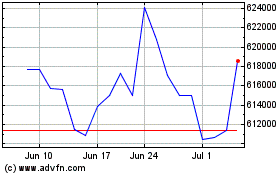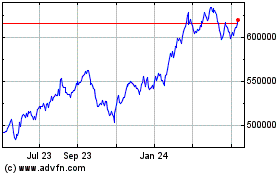By David Benoit, Dana Mattioli and Nicole Friedman
Warren Buffett's battle for control of a Texas power company
took a turn Friday as a new mystery bidder emerged to challenge
Berkshire Hathaway Inc.'s $9 billion offer.
The bidder is the third entity currently seeking to buy Oncor, a
Texas-based power-transmission company. Mr. Buffett's bid is also
being challenged by hedge fund Elliott Management Corp., a big
debtholder of Energy Future Holdings Corp., the bankrupt firm that
owns most of Oncor.
The bidder's existence materialized in a late-scheduled hearing
in bankruptcy court in Wilmington, Del., but its identity wasn't
revealed. Keith Wofford, lawyer for Elliott, identified the new
contender at the hearing as "a large investment grade utility."
The energy unit of Berkshire struck a deal to buy Oncor for $9
billion in cash last month. The move would further cement
electricity as one of the conglomerate's largest businesses and
partly satiate Mr. Buffett's desire to spend some of Berkshire's
$99.7 billion of cash on acquisitions.
But Elliott, which is run by billionaire Paul Singer, was
assembling a deal of its own that it says would be worth hundreds
of millions of dollars more for creditors. The details of where
that bid stands are unknown.
Mr. Wofford, the Elliott lawyer, said at the hearing that on
Wednesday, Energy Future called Elliott to test its reaction to a
"firm bid for $9.3 billion that has emerged."
At the time, he said, Energy Future was considering breaking
from the Berkshire agreement, to pursue talks with the new
contender.
Energy Future lawyer Mark McKane said at the hearing on Friday
that the company's board is still considering the potential deal,
as well as amendments to the Berkshire deal. The board met Friday
and will meet again Sunday, he said.
"We are still evaluating the situation, but no decisions have
been made, " Mr. McKane said.
Elliott has amassed the largest position in Energy Future's debt
and this week strategically bought a certain slice of notes that
would ensure its ability to block a deal, people familiar with the
matter said.
On Wednesday after the Elliott move, Mr. Buffett did what he
usually does when confronted with tumult in his deal making
process: He stood pat.
Berkshire issued a statement that said it wouldn't be raising
its bid for Oncor. Mr. Buffett, Berkshire's chairman and chief
executive, has a history of sticking to his initial offer: "I'm a
'one-price' guy," he wrote in a 2007 letter to shareholders.
Berkshire also has said it would walk away if its buyout offer
wasn't approved in court next week.
Now, with the emergence of a third bidder, it is possible
neither Mr. Buffett nor Mr. Singer will emerge with Oncor, though
Berkshire still stands to reap a paycheck if the deal is squashed.
As part of the deal, it would receive a breakup fee of $270
million, though that fee would have to be approved by the
bankruptcy court.
Berkshire has earned breakup fees from failed deals in the past,
including $175 million after it withdrew its offer to buy
Constellation Energy Group Inc. in 2008.
But a $270 million consolation prize would only add to
Berkshire's swollen cash coffers, which are approaching $100
billion. Berkshire has made some smaller investments in recent
months and expanded its large stake in Apple Inc. But it hasn't
done a megadeal since August 2015, when it announced its purchase
of Precision Castparts Corp. for more than $32 billion, its biggest
acquisition ever.
"The question is, are we going to be able to deploy it?" Mr.
Buffett said of Berkshire's cash holdings at the company's annual
meeting in May. "At a point the burden of proof really shifts to
us, big time. And there's no way I can come back here three years
from now and tell you that we hold $150 billion or so in cash or
more, and we think we're doing something brilliant by doing
it."
Kraft Heinz Co., which is partly owned by Berkshire and
Brazilian private-equity firm 3G Capital, made a $143 billion
approach to take over Unilever PLC in February but backed away
after Unilever declined. Berkshire would have invested $15 billion
if the deal were reached, Mr. Buffett said at the annual
meeting.
A new offer for Oncor would be the latest twist in the
long-running saga of the fate of Energy Future, formerly known as
TXU, which has been under chapter 11 bankruptcy protection since
2014. The news of the new bidder came out as Elliott was attempting
to learn more about the bid in its efforts to block the Berkshire
deal.
Elliott's purchase of more debt caught some Oncor customers and
stakeholders who were following the case by surprise, a person
familiar with the matter said.
The fight for Oncor could come to a head on Monday, as a judge
is scheduled to decide whether to green light Berkshire's $9
billion takeover offer.
Groups of major Oncor customers and other market participants
have publicly supported Berkshire's bid. Late Friday, five
stakeholder groups announced an agreement with Berkshire that
"resolves all issues" and asked Texas regulators to approve the
deal, Berkshire said in a news release.
With potential other bids, said Geoffrey Gay, counsel for a
coalition of cities served by Oncor, "I can't put my clients' name
on any document, like we did with Berkshire, without knowing who
we're going to be dealing with."
Obtaining regulatory clearance will be key to any successful
bid. Two earlier attempts to sell Oncor -- to Hunt Consolidated
Inc. of Texas and Florida's NextEra Energy Inc. -- foundered due to
action by Texas energy regulators. With money running short, Energy
Future can't afford another failed deal for the business, its crown
jewel.
Regulators have heard little from bidders besides Berkshire,
said Brian Lloyd, the executive director of the Texas Public
Utility Commission, at a meeting in Austin, Texas, on Thursday.
"There have been plenty of meetings, but at this point that list
of details as to ... who the investors are, what the debt levels
are, what the governance rights are, we have not received a
complete list of those things," he said. "Some of the details we
have received, I think, in many of the parties' minds will raise
some questions."
If Berkshire's bid succeeds, Oncor would become part of
Berkshire Hathaway Energy, a collection of energy and utility
businesses run by 55-year-old Greg Abel. Mr. Abel, who became chief
executive of the energy subsidiary in 2008, is widely considered
one of the top candidates to succeed Mr. Buffett as chief executive
of Berkshire.
If Mr. Buffett loses the deal, it wouldn't be the first time his
attempts to wade into Energy Future didn't go his way. Berkshire
spent $2.1 billion in 2007 on high-yielding Energy Future Holdings
bonds. It sold the bonds in 2013 and lost $873 million pretax on
the investment, Mr. Buffett said in his 2013 letter to
shareholders.
"Most of you have never heard of Energy Future Holdings.
Consider yourselves lucky; I certainly wish I hadn't," he wrote in
the letter. In a prior letter, he said he had "totally
miscalculated the gain/loss probabilities when I purchased the
bonds."
--Peg Brickley contributed to this article.
Write to David Benoit at david.benoit@wsj.com, Dana Mattioli at
dana.mattioli@wsj.com and Nicole Friedman at
nicole.friedman@wsj.com
(END) Dow Jones Newswires
August 18, 2017 19:33 ET (23:33 GMT)
Copyright (c) 2017 Dow Jones & Company, Inc.
Berkshire Hathaway (NYSE:BRK.A)
Historical Stock Chart
From Mar 2024 to Apr 2024

Berkshire Hathaway (NYSE:BRK.A)
Historical Stock Chart
From Apr 2023 to Apr 2024
